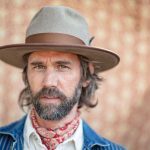Folk Alliance 2017, Day 2: Ani DiFranco Delivers Inspirational Keynote
Community is the heart of folk music. The songs about land and kinship that grandparents and aunts and uncles teach their children around the family table, the sea shanties that sailors sang to while away long voyages, the protest songs that bring people together in community to sing out lustily against unjust involvement in wars or egregious violations of civil rights, and even chants and hollers uniting individuals in a call and response expressing hatred, subversion, and love offer only a very few examples of the ways that music creates community.
Authentic community embraces and uplifts; it accepts the stranger, offering hospitality; it allows for conversation and disagreement and provides a safe space for dialogue about differences; it encourages a bold and open look in the eyes of others in community and a recognition of each other’s humanity. The strongest communities endure and offer spaces where diverse voices express dissent and hope and where resistance to forces that have the potential to tear the fabric of the community provide the resilience that allows the community to endure and grow and eventually to flourish.
Communities often grow out of rocky and barren ground, too, and prisons either stifle community or encourage the development of close-knit communities that allow individuals to thrive. On the third day of the 29th annual Folk Alliance, artist-in-residence Rita Chiarelli, and Italian-Canadian blues musician, shared her work with the Topeka Prison Project called Blues Behind Bars. Over the past few years, Chiarelli has visited the Topeka Correctional Institute for Women, teaching women who come to her sessions to sing blues and gospel. She formed a choir of over 20 women, giving these individuals a voice, and prior to Ani DiFranco’s keynote, Folk Alliance organizers shared a video of Chiarelli’s work in the prison. In moving and inspirational vignettes we watched Chiarelli and these women slowly form community through music, singing “Will the Circle Be Unbroken” and other familiar spirituals; in February 2016, the choir donned robes and sang for the first time in a performance at the prison. As Chiarelli told the audience here, music gave every individual in the choral ensemble a chance to be a part of something bigger than themselves and to flourish through the music. The music changed my heart, she said, and it continues to do so.
[Follow No Depression’s Folk Alliance coverage on Instagram]
Chiarelli’s presentation provided the just-right introduction to Ani DiFranco’s keynote, which not only focused on two keys to making and sustain community against forces which would destroy it—resistance and persistence—but also on the one tool we have in the United States that can insure that communities can actually flourish and endure—voting. She greeted her folk family and shared her initial fear of having only 20 minutes to share her thoughts: “I thought ‘holy shit’, how am I going to talk for 20 minutes?” Upon reflection on her own activism and life in music she thought, “how can I talk for only 20 minutes?” In her disarming, welcome-to-the-circle-of-conversation style, DiFranco shared stories about her own early days in the music business and her recognition and embrace of resistance. “By the time I had the eyes to see,” she said about growing up during the days of the Reagan administration, “what I saw was a world where product motive and greed were taking over, and I felt that big picture was bad, and I didn’t want to participate in that.” She embraced resistance to this big picture of greed by refusing to sing a record deal with a large record company. “Early on,” she told the crowd, “record companies starting coming my way, but I started to resist all those carrots being dangled in front of me.” “I didn’t do that because I had my own carrot farm,” she laughed, “but because I was trying to make myself accountable to something.”
As she shifted comfortably from her early days in record business to her current work of activism, she focused on voting and her own work to encourage people to get out and vote. As the political campaigns wound down toward the election, DiFranco arrived in Florida to work on a get-out-the-vote initiative. “When I was in Florida on a get the vote out campaign in the final days of the campaigns, I watched this video where one person said ‘I vote for the environment’; another said ‘I vote for women’s rights’, and every person seemed to vote to his or her cause.” DiFranco thought, the “me-ness of our generation has overtaken us.” “A vote is not self-expression; it is an expression that you’re making yourself accountable to something else,” she insisted powerfully. “I hope we can apply persistence on our will to vote,” DiFranco affirmed, and she closed by quoting songwriter Rebecca Solnit: “Voting is a chess move, not a valentine.”
During a brief question-and-answer with Bluegrass Situation executive director Amy Reitnouer, DiFranco offered a few suggestions for persisting in the face of the current political administration. When Reitnour asked her how we can persist, DiFranco replied, “Fuck the screens; fuck the social media; Get together with your fellow human beings and let each other know that we’re not alone. The days when I knew I could go on were the days when I got out in the streets with my fellow human beings in those marches and I felt real hope.”
When Reitnouer asked who’s writing today’s protest songs. DiFranco laughed and told her that, “I imagine there are a lot of people in this audience who can answer that question better than I can.” She then replied, “I’d advocate for broadening the scope of where this protest art is coming from; a lot of rappers are making protest music, and a lot of comedians are doing such a great job of protesting through comedy. Let’s make our canvas bigger.”
DiFranco acknowledged that the folk community is a network where we’ll learn from each other. She admits, especially when talking about Pete Seeger, “if I have any smarts in this life, it was that early on I decided to follow my teachers—Utah Phillips, Pete Seeger, Nora Guthrie. To be around Pete was to learn to be human.”
The Folk Alliance community then played into the early morning hours with packed official showcases as well as sparsely attended private showcases where musicians sang sometimes to audiences of three people. But that’s the beauty of Folk Alliance: we embrace and encourage, even when two or three are gathered, for our raised voices flourish and endure.




